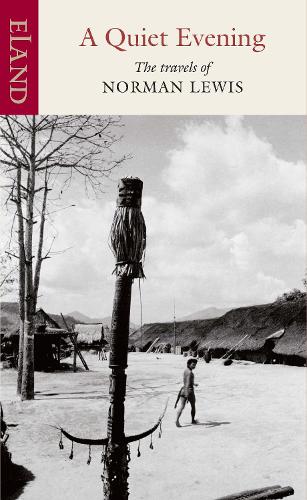
A Quiet Evening: The Travels of Norman Lewis
(Hardback)
Available Formats
Publishing Details
A Quiet Evening: The Travels of Norman Lewis
By (Author) Norman Lewis
Eland Publishing Ltd
Eland Publishing Ltd
1st May 2025
5th December 2024
United Kingdom
Classifications
General
Non Fiction
910.4092
Physical Properties
Hardback
504
Width 140mm, Height 216mm
Description
This book contains the very best of Norman Lewis's travel writing.
If you already own The Changing Sky (Jonathan Cape, 1959) which was later expanded by Eland (in 1986 with the addition of another eight pieces) and given a fresh title, A View of the World, you will encounter stories you have already read. An additional source are the three collections published by Picador, To Run Across the Sea (1989) The Happy Ant Heap (1998), and A Voyage by Dhow (2001) which sometimes included, or re-worked material, that had appeared in other books. By happy agreement with the literary estate of Norman Lewis, all these five books have been withdrawn, so that all the best pieces are now in one book A Quiet Evening. Norman always acknowledged the editors who commissioned him to travel most of these pieces were originally written at the instigation of the New Yorker, The Sunday Times, the Observer and New Statesman.
Reviews
Lewis is such a fine and amusing writer and also such an intensely moral and humane one that he can make even the most horrible situations both bearable and instructive.' - William Dalrymple, Sunday Times
Author Bio
Norman Lewis's early childhood, as recalled in Jackdaw Cake (1985), was spent partly with his Welsh spiritualist parents in Enfield, North London, and partly with his eccentric aunts in Wales. Forgoing a place at university for lack of funds, he used the income from wedding photography and various petty trading to finance travels to Spain, Italy and the Balkans, before being approached by the Colonial Office to spy for them with his camera in Yemen. He moved to Cuba in 1939, but was recalled for duty in the Intelligence Corps during the Second World War. It was from this that Norman Lewis's masterpiece, Naples '44, emerged, a resurrection of his wartime diary only finally published in 1978. Before that came a number of novels and travel books, notably A Dragon Apparent (1951) and Golden Earth (1952), both of which were bestsellers in their day. His novel The Volcanoes Above Us, based on personal experiences in Central America, sold six million copies in paperback in Russia and The Honoured Society (1964), a non-fiction study of the Sicilian Mafia, was serialised in six instalments by the New Yorker.
Norman Lewis wrote thirteen novels and thirteen works of non-fiction, mostly travel books, but he regarded his life's major achievement to be the reaction to an article written by him entitled 'Genocide in Brazil', published in The Sunday Times in 1968. This led to a change in the Brazilian law relating to the treatment of Indians, and to the formation of Survival International, the influential international organisation which campaigns for the rights of tribal peoples. He later published a very successful book called The Missionaries (1988) which is set amongst the Indians of Central and Latin America.
